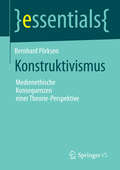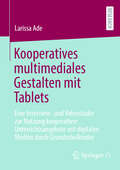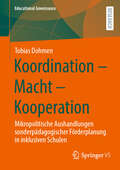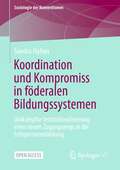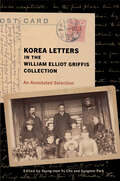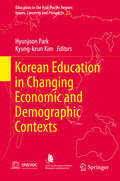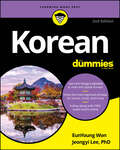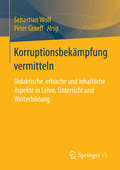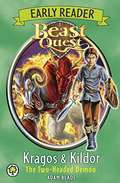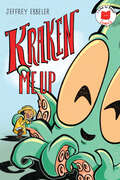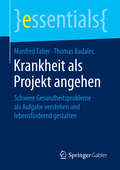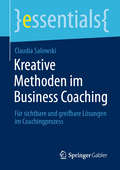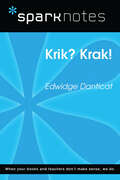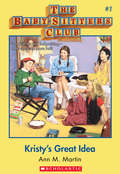- Table View
- List View
Konstruktivismus: Medienethische Konsequenzen einer Theorie-Perspektive (essentials)
by Bernhard PörksenDieser Essay stellt sich einem doppelten Anspruch: Zum einen soll - kurz und knapp - in die Erkenntnistheorie des Konstruktivismus eingeführt werden, die in den verschiedensten Disziplinen (Medien- und Kommunikationswissenschaft, Soziologie etc. ) für Aufsehen gesorgt hat. Zum anderen gilt es zu zeigen, in welcher Weise die Kernaussagen und Prämissen des Konstruktivismus (Abschied von der Idee absoluter Wahrheitserkenntnis, Orientierung am ,,Beobachter" bzw. dem Erkennenden, Akzeptanz der Pluralität von Wirklichkeitskonstruktionen etc. ) für die medienethischen Debatten folgenreich sind. Deutlich wird, dass die konstruktivistischen Einsichten zu einer grundsätzlichen Skepsis inspirieren und eine radikale Verantwortungsethik begründbar machen. Jeder ist, so das hier entfaltete Argument, für seine Wirklichkeitskonstruktion verantwortlich.
Kontextsensible Kindheitsforschung: Eine kritische Reflexion des Well-being Konzepts am Beispiel von Kindheit in Nepal (Kinder, Kindheiten und Kindheitsforschung #32)
by Johanna WilmesInternational vergleichende Kindheitsforschung stellt vorrangig die Frage nach dem Universalistischen von Kindheit und dabei wird häufig auf westliche Vorstellungen zurückgegriffen. Doch wie Kindheit ausgestaltet ist, hängt maßgeblich vom Kontext ab, in dem sie stattfindet. Im Zentrum dieser Studie stehen die Erfahrungen und das Wohlbefinden von Kindern, die in Heimen in Nepal aufwachsen. Am Beispiel dieses Kontextes lassen sich analytische Spannungsfelder der Kindheits- und auch Well-being- Forschung entfalten. Wie lassen sich Konzepte der Kindheitsforschung wie Agency und Vulnerabilität in diesem spezifischen Forschungskontext diskutieren? Wie kann in der (quantitativen) Well-being- Forschung methodologisch mit der Verschiedenheit von Kindheiten umgegangen werden? Zugleich macht die Studie westliche Verstrickungen und Verantwortlichkeiten für das Aufwachsen von Kindern in Heimen des Globalen Südens sichtbar. Die Kinder selbst werden in dieser Mixed-Methods- Studie aktiv in den Forschungsprozess einbezogen, ihre eigenen Stimmen und Erfahrungen eröffnen einen sensiblen Einblick in ihren Lebenskontext.
Kontexturanalyse: Theorie und Methode einer systemischen Sozialforschung
by Till Jansen Werner VogdIn den letzten 20 Jahren hat sich in der qualitativen und rekonstruktiven Sozialforschung vermehrt die Frage gestellt, wie sich polyphone, polykontexturale und in ihren Sinnbezügen mehrdeutige Verhältnisse erforschen lassen. In diesem Buch wird ein Zugang vorgestellt, der von Mehrdeutigkeiten ausgehend Systemdynamiken rekonstruiert. Die theoretischen und methodischen Überlegungen werden anhand von Beispielen aus der Organisations- und Managementforschung sowie der Erforschung der Selbst- und Weltverhältnisse religiöser Akteure vorgeführt.
Kontinuitäten der Stigmatisierung von ,Asozialität': Perspektiven gesellschaftskritischer Politischer Bildung (Citizenship. Studien zur Politischen Bildung)
by Dirk Lange Helga Amesberger Judith Goetz Brigitte HalbmayrMag.a Dr.in Helga Amesberger ist Senior Researcher am Institut für Konfliktforschung, Wien. MMag.a Judith Goetz ist Universitätsassistentin am Zentrum für Lehrer*innenbildung der Universität Wien.Mag.a Dr.in Brigitte Halbmayr ist Senior Researcher am Institut für Konfliktforschung, Wien.Dr. Dirk Lange ist Universitätsprofessor für die Didaktik der Politischen Bildung am Institut für Politikwissenschaft der Leibniz Universität Hannover.
Konzepte reflexiver Praxisstudien in der Lehrer*innenbildung
by Dorit Bosse Jens KlusmeyerDie Forderung nach einer praxisorientierten Lehrer*innenbildung ist seit vielen Jahren virulent. Für die Professionalisierung angehender Lehrkräfte ist dabei entscheidend, Praxisbezüge in einen pädagogischen und fachdidaktischen Reflexionskontext zu stellen. Diesen Ansatz von Praxis und domänenbezogener Reflexion verfolgen die Beiträge aus den Bildungswissenschaften und Fachdidaktiken, die im Rahmen des Kasseler Projekts Professionalisierung durch Vernetzung – Fortführung und Potenzierung (PRONET2) der „Qualitätsoffensive Lehrerbildung“ entstanden sind.Die Beiträge verbinden Praxisstudien mit unterschiedlichen Reflexionsanlässen, die sich auf Lehr-Lernszenarien, ganze Seminarkonzeptionen oder die Begleitung von Schulpraktika beziehen. Dabei geht es um Reflexionsgegenstände wie Unterrichtsvideos, Reflexionshandlungen wie Blogeinträge sowie Untersuchungen zum Reflexionsvermögen, zur Reflexionsgüte und zur Wirksamkeit von inhaltlich ausgerichteter Reflexion. Der Band zeigt konzeptionell wie empirisch auf, wie reflexive Praxisstudien zu einem wichtigen Bestandteil einer – auch phasenübergreifend angelegten – Lehrer*innenbildung werden können.
Kool Ada
by Sheila Solomon KlassWhen Ada, a tough, street-fighting transplant from coal mining country to the Chicago slums, gets the no-nonsense Ms. Walker as a teacher, she learns that there are other ways to stand up for yourself.
Kooperationen in der wissenschaftlichen Weiterbildung (Theorie und Empirie Lebenslangen Lernens)
by Franziska SweersWissenschaftliche Weiterbildung zeichnet sich durch eine hohe Kooperationsaffinität aus. Hochschulen arbeiten in diesem Feld in vielfältiger Art und Weise mit externen Partnern zusammen. Kooperationen werden als relevanter Faktor in der Strategieentwicklung als auch als handlungsleitender Modus bei der Angebotsentwicklung erkannt.Notwendigkeiten für das Kooperieren mit verschiedenen Akteuren lassen sich für das Geschäftsfeld der wissenschaftlichen Weiterbildung zahlreiche finden. Die Beiträge des vorliegenden Sammelbandes zeigen Beispiele zu Nachfrage- und Praxisorientierung, Ressourcengewinnung, Implementierung und Verstetigung sowie zur Anbahnung, Formalisierung und zum Management von Kooperationen.
Kooperatives multimediales Gestalten mit Tablets: Eine Interview- und Videostudie zur Nutzung kooperativer Unterrichtsangebote mit digitalen Medien durch Grundschulkinder
by Larissa AdeDie vorliegende qualitative Studie nimmt einer Angebots-Nutzungs-Vorstellung von Unterricht folgend die Nutzungsprozesse beim kooperativen multimedialen Gestalten mit Tablets als exemplarisches Unterrichtsangebot zur Förderung von Medienkompetenz in den Blick. Dabei werden in einem multimethodischen Vorgehen sowohl die Perspektiven der Schüler*innen auf das Unterrichtsangebot und dessen Nutzung erfasst als auch Kooperationsprozesse der Schüler*innen aus einer Beobachtungsperspektive videogestützt beobachtet. Zusammengefasst verweisen die Ergebnisse auf Herausforderungen der Schüler*innen, die vielfältigen Anforderungen an die Peer-Interaktionen beim kooperativen Gestalten mit Tablets gemeinsam zu bewältigen. Diese Herausforderungen werden durch die Vorstrukturierung durch ein Kooperationsskript teilweise reduziert, sodass eine große Bedeutung von Vorstrukturierungsmaßnahmen auch für kreative und schüler*innen-orientierte Lehr-Lern-Gelegenheiten angenommen werden kann. Aus den Ergebnissen der Studie werden sowohl Implikationen für die Gestaltung und Vorstrukturierung förderlicher kooperativer Lehr-Lern-Settings mit digitalen Medien als auch für die Förderung von Medienkompetenz in der Grundschule abgeleitet.
Koordination - Macht - Kooperation: Mikropolitische Aushandlungen sonderpädagogischer Förderplanung in inklusiven Schulen (Educational Governance #60)
by Tobias DohmenDieses Buch präsentiert eine Grounded Theory Studie, die das Verfahren der sonderpädagogischen Förderplanung an inklusiven Schulen in Nordrhein-Westfalen untersucht. Analysiert wird, wie sonderpädagogische Lehrpersonen und Regelschullehrer*innen anlässlich eines verordneten Kooperationsauftrags Informationen über Schüler*innen tauschen. Als ein Abstimmungsmechanismus wird herausgearbeitet, wie sich die beteiligten Lehr*innen mittels Verhandlungsstrategien darüber einigen, wie ihre individuellen Beiträge in die kooperative Erstellung der Förderplandokumente einfließen.Die Forschungsarbeit schließt in einem organisationssoziologischen Zugang an der Tradition einer „schulbezogenen Kooperationsforschung“ (Idel et al. 2012, 10) an und erweitert diese um mikropolitische Perspektiven auf die regulativen Verhältnisse inklusiver Lehrer*innenkooperation. Anhand der Rekonstruktion organisationaler Mikropraxen wird die „Frage der Handlungskoordination, der Art und Funktionalität des Zusammenwirkens verschiedener Einzelbeiträge zur Koordination und Entwicklung des Gesamtsystems“ (Altrichter et al. 2005, 7; Hervorheb. i. O.) fokussiert.
Koordination und Kompromiss in föderalen Bildungssystemen: Umkämpfte Institutionalisierung eines neuen Zugangswegs in die Lehrpersonenbildung (Soziologie der Konventionen)
by Sandra HafnerIn vielen Ländern bereitet traditionell das Gymnasium auf die Lehramtsausbildung vor. Diese multimethodische Open Access Studie befasst sich mit der umkämpften Institutionalisierung eines zweiten, alternativen Zugangswegs (Fachmittelschule) in die Lehrpersonenbildung in der Schweiz. Mit der Analyse von Kritik, Konflikt und Kompromiss werden Prozesse der Harmonisierung von Bildung bei gleichzeitiger Bewahrung von regionalen Eigenheiten untersucht. Die Studie leistet damit einen Beitrag zur Erklärung von bildungspolitischer Handlungskoordination in föderalen Bildungssystemen.Ebenso nimmt die Studie die Fachmittelschule und das Gymnasium vergleichend als schulische Dispositive in den Blick. Anhand von Fallstudien wird gezeigt, wie die beteiligten schulischen Akteur*innen diese Dispositive konstruieren und (de-)valorisieren, und wie daraus unterschiedliche Sozialisationsumgebungen für Jugendliche entstehen. Auf dieser Grundlage lässt sich die unterschiedliche Bedeutung der beiden Schultypen für die Lehrpersonenbildung erklären. Damit wirft die Studie eine neuen, konventionensoziologischen Blick auf Schulkultur(en) als Wertigkeitsdispositive und ermöglicht eine institutionelle Perspektive auf die Formung von Berufs- und Studienwahlmotiven.
Korah: The JPS B'nai Mitzvah Torah Commentary (JPS Study Bible)
by Rabbi Jeffrey K. SalkinKorah (Numbers 16:1-18:32) and Haftarah (1 Samuel 11:14-12:22): The JPS B’nai Mitzvah Torah Commentary shows teens in their own language how Torah addresses the issues in their world. The conversational tone is inviting and dignified, concise and substantial, direct and informative. Each pamphlet includes a general introduction, two model divrei Torah on the weekly Torah portion, and one model davar Torah on the weekly Haftarah portion. Jewish learning—for young people and adults—will never be the same. The complete set of weekly portions is available in Rabbi Jeffrey K. Salkin’s book The JPS B’nai Mitzvah Torah Commentary (JPS, 2017).
Korea Letters in the William Elliot Griffis Collection: An Annotated Selection
by William Eilliot GriffisWilliam Elliot Griffis (1843 – 1928) graduated from Rutgers College in 1869 and taught four years in Fukui and Tokyo. After his return to the United States, he devoted himself to his research and writing on East Asia throughout his life. He authored 20 books about Japan and five books about Korea including, Corea: The Hermit Nation (1882), Corea, Without and Within: Chapters on Corean History, Manners and Religion (1885), The Unmannerly Tiger, and Other Korean Tales (1911), A Modern Pioneer in Korea: The Life Story of Henry G. Appenzeller (1912), and Korean Fairy Tales (1922). In particular, his bestseller, Corea: The Hermit Nation (1882) was reprinted numerous times through nine editions over thirty years. He was not only known as "the foremost interpreter of Japan to the West before World War I but also the American expert on Korea. After his death, his collection of books, documents, photographs and ephemera was donated to Rutgers. The Korean materials in the Griffis Collection at Rutgers University consist of journals, correspondence, articles, maps, prints, photos, postcards, manuscripts, scrapbooks, and ephemera. These papers reflect Griffis's interests and activities in relation to Korea as a historian, scholar, and theologian. They provide a rare window into the turbulent period of late nineteenth- and twentieth-century Korea, witnessed and evaluated by Griffis and early American missionaries in East Asia. The Korea Letters in the William Elliot Griffis Collection are divided into two parts: letters from missionaries and letters from Japanese and Korean political figures. Newly available and accessible through this collection, these letters develop a multifaceted history of early American missionaries in Korea, the Korean independence movement, and Griffis's views on Korean culture.
Korean Education in Changing Economic and Demographic Contexts
by Hyunjoon Park Kyung-Keun KimThis edited volume offers a comprehensive survey of Korean education in transition. Divided into three parts, the book first assesses the current state of Korean education. It examines how the educational system handles the effects of family background and gender in helping students smoothly transition from school to the labor market. Next, the book introduces growing concerns over whether the traditional model of Korean education can adequately meet the demands of the emerging knowledge-based economy. It examines features of new reform measures that have been introduced to help Korean education prepare students for the new economy. The third part discusses how an influx of diverse migrant groups, including marriage migrants, migrant workers, and North Korean migrants, and the rising divorce rate -- two major demographic changes-- challenge the fundamental assumption of cultural homogeneity that has long been a part of Korean education. This detailed analysis of a society and educational system in transition will appeal to a wide range of readers, from those involved with Korean education to educators and administrators in countries currently looking for ways to handle their own economic and demographic changes.
Korean For Dummies
by EunYoung Won Jeongyi LeeLearn Korean with the engaging Dummies method You love the culture, and you love the language. Korean For Dummies helps you get the basics of Korean so you can communicate successfully, even if you've never studied another language before. This fun guide will help you get the hang of spelling, vocabulary, and grammar, so you can travel, do business, or just enjoy learning something new. Online audio content gives you a well-rounded Korean language learning experience and helps you improve your pronunciation and listening skills. Plus, you'll learn key vocab for common situations you'll encounter while traveling in Korea. Learn Korean alphabets and sounds so you can communicate authentically Dip into the culture and history of North and South Korea Master numbers, verb tenses, travel expressions, and beyond Practice, practice, practice your Korean with included audio resources Beginner students or those wanting to better their Korean reading, writing, and speaking skills will find what they need in Korean For Dummies
Korruptionsbekämpfung vermitteln: Didaktische, ethische und inhaltliche Aspekte in Lehre, Unterricht und Weiterbildung
by Sebastian Wolf Peter GraeffDer Band widmet sich der Vermittlung von Kompetenzen und Wissen zu den Themen Korruption und Korruptionsbekämpfung in unterschiedlichen Bildungseinrichtungen und Wissenschaftsdisziplinen. Es werden übergreifende methodische, empirische und theoretische Themen ebenso behandelt wie verschiedene Anwendungsfelder und Veranstaltungsformate. Die Bereiche Verwaltung, Wirtschaft und Zivilgesellschaft werden praxisnah angesprochen. Der Sammelband schließt eine Lücke in der wissenschaftlichen Korruptionsliteratur, die bisher überwiegend die Forschung, aber kaum die Perspektive der Wissensvermittlung in unterschiedlichen Kontexten thematisiert hat.
König, Weiser, Liebhaber und Skeptiker: Rezeptionen Salomos (Studien zu Literatur und Religion / Studies on Literature and Religion #4)
by Susanne Gillmayr-Bucher Elena Deinhammer Antonia Krainer Imelda RohrbacherKaum eine andere biblische Figur wird so enthusiastisch geschildert wie König Salomo. Er ist unvergleichlich weise, erbaut den Tempel in Jerusalem, und er verhilft auch seinem Volk zu einem Leben in Frieden und Wohlstand. Dennoch scheitert Salomo und erfüllt die in ihn gesetzten Erwartungen letztendlich nicht. Dadurch entsteht ein ambivalentes Bild, das innerhalb des biblischen Kanons und in der späteren Rezeptionsgeschichte vielfältig ausgestaltet wird. Wie facettenreich die Figur Salomos vom 16. bis 21. Jahrhundert in Literatur und Musik entfaltet wird, zeigt dieser Band auf. Die Beiträge im ersten Teil bieten überblicksartige Querschnitten, die Salomo als König, Weisen, Skeptiker und Liebenden in den künstlerischen Bearbeitungen präsentieren. Die Studien im zweiten Teil zeigen am Beispiel ausgewählter Werke, welche Diskurse der jeweiligen Zeit in der Figur König Salomos gespiegelt werden.
Kragos & Kildor the Two-headed Demon (Beast Quest Early Reader #2)
by Adam BladeAvantia's precious Cup of Life has been stolen. Tom must get it back, or the kingdom will be destroyed - but he is in terrible danger from Kragos and Kildor's deadly secret power...Beast Quest Early Readers are perfect for children learning to read and for families to enjoy together, with text vetted by a literacy expert and bright new colour illustrations.Also available: Beast Quest Early Reader 1: Vedra & Krimon, Twin Beasts of Avantia. Look out for more!
Kraken Me Up (I Like to Read Comics)
by Jeffrey EbbelerIzzie and her unusual pet make a big splash at the county fair in this punny easy reader comic from a beloved children's book illustrator and comics artist.Izzie can't wait to debut her pet at the county fair. While the other children have brought pigs or chickens, Izzie brought a...Kraken! Even though everyone thinks Kraken is big and frightening, he is not. He's like Izzie, sweet and shy. Kraken and Izzie use creativity and humor to win over the crowd in this hilariously adorable comic. The variety of panel styles, speech bubbles, and fonts are all perfect for engaging developing readers. I Like to Read Comics are created for kids just learning to read. Sequential art and simple text--and a powerful relationship between the two--are the perfect conditions for developing readers. A Junior Library Guild Gold Standard Selection
Krankheit als Projekt angehen: Schwere Gesundheitsprobleme als Aufgabe verstehen und lebensfördernd gestalten (essentials)
by Manfred Faber Thomas BadalecDieses essential unterst#65533;tzt Betroffene, die stets engagiert und leistungsorientiert alle beruflichen Aufgaben und Herausforderungen gemeistert haben. Es hilft ihnen, ihre Erfahrungen und Kompetenzen auf die eigene Krankheit anzuwenden und f#65533;r ihre Genesung oder mehr Lebensqualit#65533;t im Leben mit der Krankheit nutzbar zu machen. Gewohnte Arbeitsmethoden, wie ,,Meetings" mit #65533;rzten oder die Job-Gestaltung in Abwesenheit, bieten vertraute Pfade und verleihen eine gewisse Sicherheit. Die Autoren schreiben aus authentischer Erfahrung. Sie sind selbst beruflich sehr engagierte Pers#65533;nlichkeiten, die lebensbedrohliche Diagnosen erhielten, schwere Krankheiten durchlebten und ihre Erfahrungen nun teilen, um anderen zu helfen.
Kreative Methoden im Business Coaching: Für sichtbare und greifbare Lösungen im Coachingprozess (essentials)
by Claudia SalowskiCoaching ist häufig ein vom Dialog geprägter Prozess: Anliegen, Probleme, Herausforderungen, Lösungsansätze und weitere Schritte, all das wird meist in Form einer Konversation bearbeitet, die Auseinandersetzung ist stark linkshirnig geprägt, also auf Sprache, Fakten, Logik ausgerichtet. Um Veränderungsprozesse im Coaching nachhaltig zu unterstützen, also sichtbar und greifbar zu machen, bedarf es der Aktivierung, der bildhaften Vorstellung, der Einbindung von Emotion und Körper. Dieses Essential liefert eine Auswahl an Methoden entlang des Coaching-Prozesses und bezieht dabei auch Digitales Coaching mit ein.
Kreativität in der Schule - finden, fördern, leben (Psychologie in Bildung und Erziehung: Vom Wissen zum Handeln)
by Julia Sophie Haager Tanja Gabriele BaudsonMit Kreativität kann man Neues erschaffen. Ohne Neues geht es nicht weiter. Deshalb muss sie nun auch in der Schule gefördert werden. Und das ist in der schulischen Praxis gar nicht so einfach! Aber was genau ist Kreativität? Wo entstehen die Freiräume für Kreativität im Unterricht und wie kann man Schüler/innen mit kreativer Begabung fördern? Dieses Buch will (angehenden) Lehrkräften, pädagogischen Fachkräften, Psycholog/innen und interessierten Laien helfen, Antworten auf ihre Fragen rund um die Kreativität zu finden. Durch theoretische Ansätze, empirische Befunde und kritische Perspektiven aus Forschung und Praxis zeigen die Beiträge interessierten Leser/innen auf, unter welchen Bedingungen Kreativität wachsen kann und wie sie souverän damit umgehen können.
Krik? Krak! (SparkNotes Literature Guide Series)
by SparkNotesKrik? Krak! (SparkNotes Literature Guide) by Edwidge Danticat Making the reading experience fun! Created by Harvard students for students everywhere, SparkNotes is a new breed of study guide: smarter, better, faster. Geared to what today's students need to know, SparkNotes provides: *Chapter-by-chapter analysis *Explanations of key themes, motifs, and symbols *A review quiz and essay topicsLively and accessible, these guides are perfect for late-night studying and writing papers
Krisen des Feldzugangs: Methodologische, empirische und forschungspraktische Beiträge (Wissen, Kommunikation und Gesellschaft)
by Sylvia Marlene Wilz Max KaufmannDieses Buch bietet eine ausführliche und aktuelle Auseinandersetzung mit der Frage, wie der Zugang zum Forschungsfeld gelingen kann. Der Feldzugang ist eine notwendige Bedingung, um Feldforschung betreiben zu können – gelingt der Zugang zum Feld nicht, dann ist auch die geplante Forschung nicht möglich. Das Anbahnen eines Feldzugangs ist entsprechend eine besonders kritische Phase des Forschungsprozesses, die grundsätzlich die Eigenschaft hat, krisenhaft zu sein oder es zu werden. Diesen Sachverhalt stellt der Band in den Mittelpunkt und versammelt Beiträge, die das krisenhafte Potential von Feldzugängen aus drei Perspektiven diskutieren: Erstens mit Blick auf veränderte und erschwerte äußere Rahmenbedingungen qualitativer Forschung (Der Feldzugang in der Krise); zweitens aus einer wissenssoziologischen Sicht (Der Feldzugang als krisenhafter Prozess) und drittens aus der Perspektive der Forschungsfelder und -gegenstände (Der Feldzugang als Krise für den Forschungsgegenstand?). In dieser Diskussion verfolgt der Band das Ziel, Feldzugänge sowohl unter forschungspraktischen und methodologischen Gesichtspunkten zu erörtern als auch den Feldzugang als Forschungsgegenstand zu reflektieren. Der Band gibt Anregungen für alle, die ein empirisches Forschungsprojekt durchführen wollen und für die diejenigen, die ihre eigene Forschungspraxis selbstreflexiv thematisieren. Er bietet Anschlüsse an die ethnografische Literatur, Einblicke in die Arbeit der ethnografischen Feldforschung, und er bietet wichtige Impulse für die Debatte zur Zukunft der qualitativen Sozialforschung.
Krisen erfolgreich bewältigen
by Ruth Enzler Denzler Edgar SchulerWie man aus Krisen gestärkt hervorgeht Krisen, Schicksalsschläge und Wertekonflikte lassen sich auch in den Top-Etagen von Politik und Wirtschaft nicht vermeiden. Ruth Enzler Denzler und Edgar Schuler haben namhafte Spitzenführungskräfte interviewt, um herauszufinden, wie diese im Rampenlicht der Medien und der Öffentlichkeit Krisen bewältigen. Dabei unterscheiden sie drei Typen von Menschen anhand ihrer Wertekategorien. Ob jemand um soziale Anerkennung, um Lösungen oder um Rehabilitierung kämpft – alle versuchen gemäß ihrer inneren Haltung Krisen zu überwinden. Die gute Nachricht ist: Für jeden der drei Typen – ob sozial, erkenntnis- oder ordnungsstrukturorientiert – gibt es die passende Strategie, um aus einer Lebenskrise oder scheinbar unlösbaren Situation heraus zu finden! Dieses Buch handelt von Krisen, die erfolgreich bewältigt worden sind, weil sie zu Entwicklungsschritten und tiefgreifenden Veränderungen im Sinne eines persönlichen Reifeprozesses geführt haben. So, dass die Betroffenen sagen können: „Mir geht es besser als davor.“ Das Buch kann Menschen, die in einer persönlichen Krise stecken oder sich aus anderen Gründen für dieses Thema interessieren, ein hilfreicher Ratgeber sein. Interviews mit Sepp Blatter, Susanne Hochuli, Konrad Hummler, Monisha Kaltenborn, Hans Künzle, Eric Sarasin, Rolf Soiron, Silvia Steiner, Monika Stocker und Franziska Tschudi.
Kristy's Great Idea: Kristy's Great Idea (The Baby-Sitters Club #1)
by Ann M. MartinThe hit series returns to charm and inspire another generation of baby-sitters!When Kristy Thomas has the great idea to form a baby-sitters club--a chance to earn money and spend time with her friends, all while doing something they each love to do--she has no idea how much the club will change everything.Crank calls, uncontrollable toddlers, wild pets, untruthful clients . . . running a business is hard work! Kristy and her co-founders, Mary Anne, Claudia, and Stacey, are sure they can handle anything. But only if they stick together . . .The best friends you'll ever have--with classic BSC covers and a letter from Ann M. Martin!
